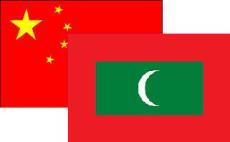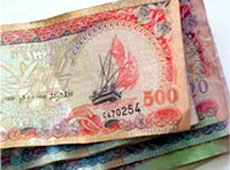President Mohamed Waheed departed on an official visit to Saudi Arabia today (July 10), a day after local media reported that former President Mohamed Nasheed’s request to perform Umra was rejected by Saudi authorities.
Nasheed, along with Parliamentary Speaker Abdullah Shahid and former Attorney General Dr Ahmed Ali Sawad, are currently in Sri Lanka waiting for their visas to Saudi Arabia to process. They will be conducting Umra, a pilgrimage to Mecca that can be undertaken at any time of year and is highly recommended but not compulsory in Islam.
Local media in the Maldives reported that Nasheed was denied a visa by the Saudi Arabian government, however former Foreign Minister Ahmed Naseem, who is currently in Sri Lanka with Nasheed, Shahid, and Sawad, refuted the claims as inaccurate.
“I’ve been in constant touch with Saudi [Arabian government] Royal Protocol officials and Nasheed’s visa has not been rejected. They have not said anything like that,” the former Foreign Minister told Minivan News today.
“Nasheed’s visa to Saudi Arabia is being processed, it’s just a matter of time. The Foreign Ministry visa application was submitted very late, I don’t think even two weeks have passed,” said Naseem.
He believes there are a number of possible explanations for the delay in visa processing, but emphasised that there was absolutely no information coming from the Saudi Royal Protocol that Nasheed’s visa had been rejected.
“It’s taking awhile because so many presidents and former presidents [from all over the world] are traveling for Umra,” said Naseem. “[Although] it’s very likely Saudi Arabia doesn’t want Nasheed and Waheed there at the same time.”
“The whole thing has been blown out of proportion. Someone from the [Maldives] ‘baghee’ (‘traitor’) government is spreading misinformation to try and gain political capital. However, this will backfire because it’s not good to do things like this,” he declared.
“President Nasheed is a very religious person, he knows [Islam] well. Because he practices the tenets of Islam, [he knows] that going for Umra is also important,” he noted.
“If anyone is trying to prevent Nasheed from Umra it’s very bad, [fellow] Muslims should not be doing anything to obstruct any Muslim [from Islamic worship],” he continued.
Naseem said he did not believe that despite the coincidental timing of President Mohamed Waheed’s trip to Saudi Arabia, the President was intentionally obstructing Nasheed’s trip.
“Waheed is not fully informed of Islamic things, it is unlikely, but you can never know. He’s a traitor to the country and could be up to anything,” said Naseem.
Waheed’s visa to visit Saudi Arabia was issued at 5:00pm yesterday, according to Naseem.
He also noted that the Maldives’ government should be enabling and assisting its citizens to undertake religious pilgrimages.
“Infidels within the government of Maldives are not doing enough to facilitate these types of trips,” Naseem asserted.
However, an official statement from Nasheed’s spokesperson Mariya Ahmed Didi contended there had been deliberate obstruction by the Maldives’ government to obstruct Nasheed’s Umra pilgrimage.
“As we are hearing that some politicians are trying to obstruct the President’s Umra trip, the President is very saddened by this,” said Didi. “One Muslim trying to obstruct the worship of another Muslim is not something that should be done under any circumstances. We appeal for an end to this hassling.”
Meanwhile, President Waheed departed for an official visit to Saudi Arabia today to meet with top government officials, expedite some of the requests the Maldives has made to the Saudi government, and likewise perform an Umra pilgrimage.
Prior to his departure, Waheed stressed that it was difficult for him to comment on why Nasheed has not yet been issued a visa to Saudi Arabia.
“If I say anything it will just lead to speculation. How can I know something that they even don’t know?” said Waheed.
Additionally, he insisted that the government would not stymie Nasheed’s Umra pilgrimage.
“We will do everything we can to get a visa for him,” said Waheed.
Ministry of Foreign Affairs responds
Amid the conflicting reports about Nasheed’s visa obstruction and subsequent denial, the Maldives’ Consular Service Department of the Ministry of Foreign Affairs issued a statement today detailing the visa application protocol.
“1 – Upon receiving an SMS from the Minister to the Consular Department, informing that former President Mohamed Nasheed and Speaker of Parliament Abdulla Shahid were to take part in Umra this year, the Department contacted the parliament secretariat and inquired as to how Speaker Shahid wanted to obtain the visa to Saudi Arabia,” reads the statement.
“Also, the visa application form required by Saudi Arabia was shared with the protocol department in order to send the form to the office of former President Nasheed. In the meantime, discussions were carried out between the Ministry and the Maldivian High Commission in Colombo regarding the procedures involved in obtaining Umra visas for state dignitaries.
“The Ministry also on repeated occasions requested the speakers bureau of the parliament secretariat to return the filled visa application as soon as possible.
“2 – The Ministry received the completed visa application forms on July 1, 2013. On the very same day, the forms were sent in mail packets to Colombo. Also the details of persons seeking the Umra visa were also shared with Maldives High Commission in Colombo via email.
“3 – The Maldives High Commissioner in Colombo had discussion with Saudi Arabian Ambassador to Maldives about the visa. The Saudi Ambassador said that visas for VIP persons are processed after receiving permission from the Saudi Royal Palace. Therefore, he said that permission must be sought through the Saudi Ministry of Foreign Affairs. The Saudi Ambassador to Maldives is currently working on obtaining the stated permit from the Royal Palace. The Maldives High Commission had informed the [Foreign Affairs] Ministry on July 3, 2013 that Saudi Ambassador will inform them as soon as permission is received.
“4 – The information given by the Maldives High Commission in Sri Lanka to the Ministry was shared with the Saudi Embassy on the same day. A request was also made to the Embassy to speed up the process to obtain the permit. In response, the Embassy informed the Ministry that it was working on to speed up the process and said that Saudi Foreign Ministry was waiting for the word from Saudi Royal Palace,” the statement concluded.
Likes (3)Dislikes
(3)Dislikes (0)
(0)  In September 2012, President Waheed told
In September 2012, President Waheed told  electricity and phone bills if funds were not transferred from the MVR 1.8 billion (US$117 million) Public Sector Investment Programme (PSIP).
electricity and phone bills if funds were not transferred from the MVR 1.8 billion (US$117 million) Public Sector Investment Programme (PSIP).